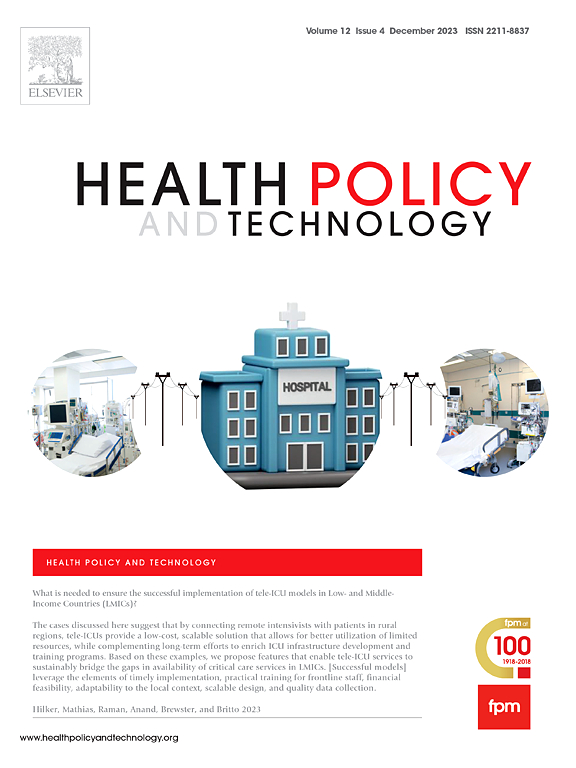Artificial intelligence in healthcare: Tailoring education to meet EU AI-Act standards
IF 3.7
3区 医学
Q1 HEALTH POLICY & SERVICES
引用次数: 0
Abstract
The integration of Artificial Intelligence (AI) in Intensive Care Units (ICUs) has the potential to transform critical care by enhancing diagnosis, management, and clinical decision-making. Generative and Predictive AI technologies offer new opportunities for personalized care and risk stratification, but their implementation must prioritize ethical standards, patient safety, and the sustainability of care delivery. With the EU AI-Act entering into force in February 2025, a structured and responsible adoption of AI is now imperative. This article outlines a strategic framework for ICU AI integration, emphasizing the importance of a formal declaration of intent by each unit, detailing current AI-use, implementation plans, and governance strategies. Central to this approach is the development of tailored AI education programs adapted to four distinct professional profiles, ranging from experienced clinicians with limited AI knowledge to new intensivists with strong AI backgrounds but limited clinical experience. Training must foster critical thinking, contextual interpretation, and a balanced relationship between AI tools and human judgment. A multidisciplinary support team should oversee ethical AI-use and continuous performance monitoring. Ultimately, aligning regulatory compliance with targeted education and practical implementation could enable a safe, effective, and ethically grounded use of AI in intensive care. This balanced approach would support a culture of transparency and accountability, while preserving the central role of human clinical reasoning and improving the overall quality of ICU care.
医疗保健中的人工智能:定制教育以满足欧盟人工智能法案标准
人工智能(AI)在重症监护病房(icu)的整合有可能通过加强诊断、管理和临床决策来改变重症监护。生成式和预测性人工智能技术为个性化护理和风险分层提供了新的机会,但它们的实施必须优先考虑道德标准、患者安全和护理服务的可持续性。随着《欧盟人工智能法案》于2025年2月生效,人工智能的结构化和负责任采用现在势在必行。本文概述了ICU人工智能集成的战略框架,强调了每个单元正式声明意图的重要性,详细说明了当前人工智能的使用、实施计划和治理策略。这种方法的核心是开发量身定制的人工智能教育计划,以适应四种不同的专业概况,从经验丰富的临床医生,有限的人工智能知识,到具有强大的人工智能背景,但临床经验有限的新重症医师。培训必须培养批判性思维、上下文解释以及人工智能工具和人类判断之间的平衡关系。一个多学科支持团队应该监督合乎道德的人工智能使用和持续的绩效监测。最终,将监管合规与有针对性的教育和实际实施相结合,可以使人工智能在重症监护中得到安全、有效和合乎道德的使用。这种平衡的方法将支持透明和问责的文化,同时保留人类临床推理的核心作用,并提高ICU护理的整体质量。
本文章由计算机程序翻译,如有差异,请以英文原文为准。
求助全文
约1分钟内获得全文
求助全文
来源期刊

Health Policy and Technology
Medicine-Health Policy
CiteScore
9.20
自引率
3.30%
发文量
78
审稿时长
88 days
期刊介绍:
Health Policy and Technology (HPT), is the official journal of the Fellowship of Postgraduate Medicine (FPM), a cross-disciplinary journal, which focuses on past, present and future health policy and the role of technology in clinical and non-clinical national and international health environments.
HPT provides a further excellent way for the FPM to continue to make important national and international contributions to development of policy and practice within medicine and related disciplines. The aim of HPT is to publish relevant, timely and accessible articles and commentaries to support policy-makers, health professionals, health technology providers, patient groups and academia interested in health policy and technology.
Topics covered by HPT will include:
- Health technology, including drug discovery, diagnostics, medicines, devices, therapeutic delivery and eHealth systems
- Cross-national comparisons on health policy using evidence-based approaches
- National studies on health policy to determine the outcomes of technology-driven initiatives
- Cross-border eHealth including health tourism
- The digital divide in mobility, access and affordability of healthcare
- Health technology assessment (HTA) methods and tools for evaluating the effectiveness of clinical and non-clinical health technologies
- Health and eHealth indicators and benchmarks (measure/metrics) for understanding the adoption and diffusion of health technologies
- Health and eHealth models and frameworks to support policy-makers and other stakeholders in decision-making
- Stakeholder engagement with health technologies (clinical and patient/citizen buy-in)
- Regulation and health economics
 求助内容:
求助内容: 应助结果提醒方式:
应助结果提醒方式:


